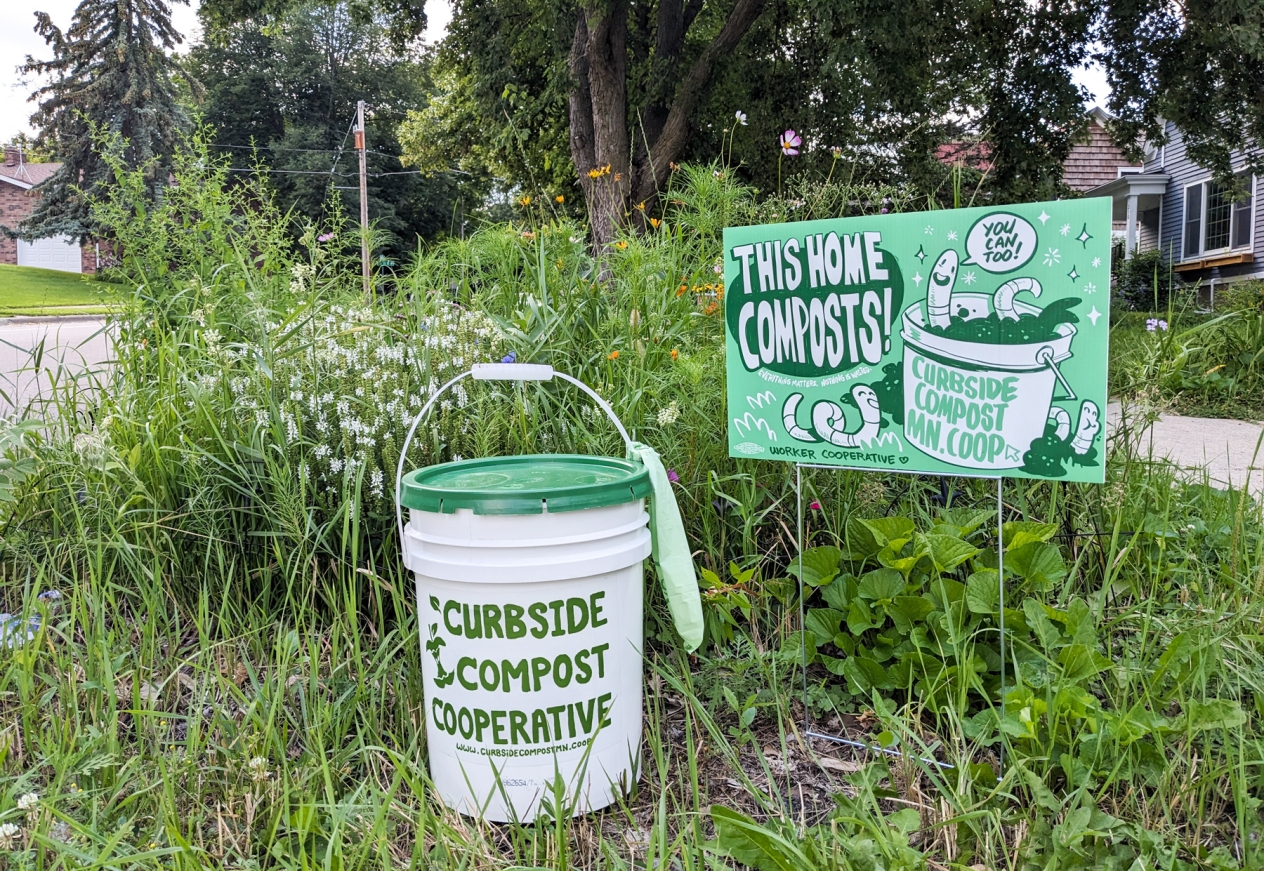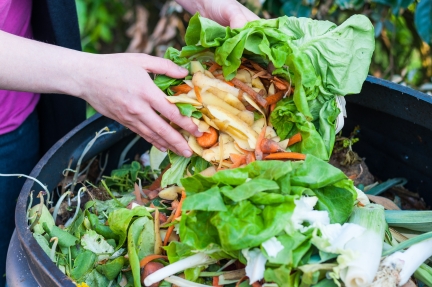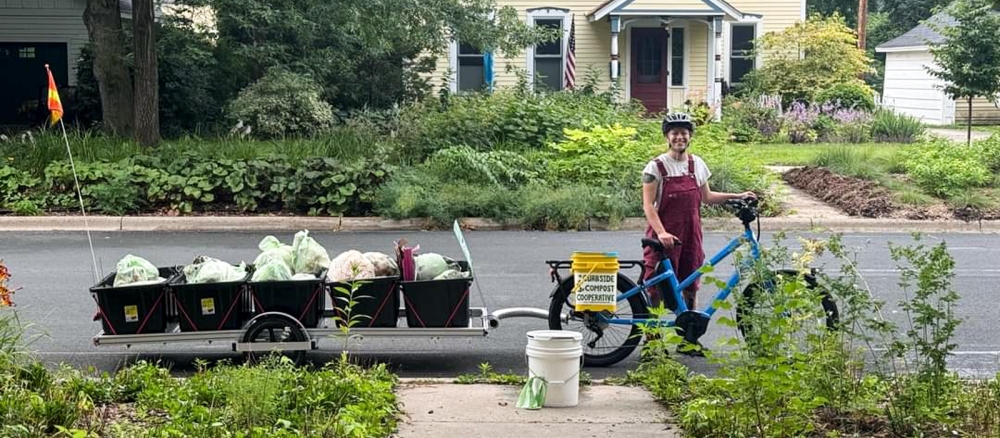Once a week, Grace Brosnan, one of the worker-owners of Curbside Compost Co-op, hops on an e-bike with a trailer behind it and collects bagged organic waste from about 140 households in Northfield. While Curbside Compost also uses trucks to serve about 800 total households, Brosnan prefers the bike.
"I can talk to people on the street this way and see our subscribers out and about," she said.
As hyperlocal as organics pickup on a bike is, however, all of the organic waste the co-op now collects goes into big dumpsters and on to Shakopee for composting. It was a good system for building the co-op, Brosnan said, but the co-op's goal has always been to compost the waste it collects locally rather than send a valuable product out of its community.

With a recent grant from the MPCA, Curbside Compost will now get to work toward that goal by starting its own composting facility in Northfield, allowing it to expand its collection services in the area and provide finished compost to local farms.
"This was the exact type of grant we needed at a really good time for us," Brosnan said. "We figured out the location, we got the zoning, and we received our permit. The pieces are finally coming together."
Keeping organics out of landfills
Curbside Compost's grant is one of seven totaling $4.5 million that the MPCA has awarded for projects across the state that will expand or improve the efficiency of organics management operations and work to reduce the amount of organic material going to landfills or incinerators.

Organics such as food waste and compostable products make up almost one-third of the municipal waste stream in Minnesota. When food is wasted, so are the resources that go into producing it. Food waste is a significant contributor to climate change, responsible for at least 2.6 percent of all U.S. greenhouse gas emissions. That’s equivalent to the annual emissions from more than 37 million cars, or one in seven cars on the road in the United States. Composting and anaerobic digestion reduce greenhouse gas emissions from food waste compared to landfilling or incineration and produce beneficial products such as compost, digestate, and biogas.
“We’re excited to fund a diverse mix of projects that tackle various aspects of the organics recycling system from education, collection, and hauling to sorting and processing the material into a final product,” said MPCA recycling and organics program administrator Gwen Jenkins. “These funds will help communities and businesses across the state grow their operations and expand access to organics recycling programs that are a key part of reducing the environmental impacts of waste.”
This grant round focused on organics management methods with a net positive environmental impact such as composting, food-to-livestock, and anaerobic digestion with beneficial use of the outputs. Other management methods with less environmental benefit including waste-to-energy and landfilling were not eligible. Additionally, this grant round did not focus on prevention of wasted food and food rescue projects.
The grant program was a one-time funding opportunity, but funding for organics management projects will be available as part of the EPA-funded Climate Pollution Reduction Grant program through the climate-smart food systems grant. These applications are tentatively slated to open in late 2025.
Grant recipients
Polk County Solid Waste
- Grant award: $1.5 million
- Project cost: $1,872,200
Polk County Solid Waste will upgrade its material recovery facility in Fosston with artificial intelligence robots to sort bags of organic material from bags of trash. It will also upgrade its existing source-separated organic material composting site in Gentilly to accept the bags of organic material from the material recovery facility. The project will divert an estimated 576 tons of organic material from disposal annually, eventually increasing to 3,247 tons annually.
Hubbard County Solid Waste
- Grant award: $1.5 million
- Project cost: $1.8 million
Hubbard County will develop a commercial organics collection route in Hubbard and Beltrami counties with the purchase of a collection truck, trailer, organics containers, bags, education and outreach materials, wages for collection staff, and outreach to commercial establishments. The county will also buy a grinder to grind brush, clean wood, and yard waste from its nine-county region. Once operational, the project will divert an estimated 3,770 tons of organic material from disposal annually.
Walters Recycling and Refuse
- Grant award: $1,032,829.40
- Project cost: $3.45 million
Ramsey and Washington Counties have implemented an organic food scrap collection program in which residents of the counties separate their organic food scraps from other municipal solid waste in food scrap bags and artificial intelligence-driven robots pick the bags out of the waste stream. Walters Recycling and Refuse is one of the transfer stations where this bag sorting technology will be installed. Once operational, the Walters Transfer Station project will divert organic material from disposal.
Curbside Compost Cooperative
- Grant award: $198,170.60
- Project cost: $239,830.60
Curbside Compost Cooperative will open a new small-scale organics processing facility near Northfield, expand commercial and event organics collection capabilities with the purchase of additional equipment and supplies, and increase educational efforts with a focus on preventing contamination. Construction of this site will provide a local source of approximately 600 cubic yards of finished compost each year. Once operational, the project will divert an estimated 180 tons of organic material from disposal annually.
Creekside Soils, the City of Hutchinson
- Grant award: $150,000
- Project cost: $186,100
Creekside Soils, owned by the City of Hutchinson, will purchase a screener with vacuum extraction capabilities to remove contamination from its organic material composting process. Once operational, the project will divert an estimated 1,500 tons of accumulated organic material from disposal, along with an estimated 170 tons annually.
Duluth Compost
- Grant award: $50,000
- Project cost: $60,000
Duluth Compost will expand the reach and impact of its organics hauling service through the acquisition and installation of new collection equipment including new organics dump unit with a cart lifter, a pickup truck for the dump unit, a cart lifter for an existing dump unit, and compatible bins. In addition to enabling expansion of Duluth Compost’s residential services, this equipment will allow Duluth Compost to service restaurants and small businesses, which represents a large opportunity to divert additional compostable waste. The project will divert an estimated 75 tons of organic material from disposal annually.
Minnesota Department of Military Affairs
- Grant award: $69,000
- Project cost: $98,056
This project will expand and improve the Minnesota Department of Military Affairs organics recycling program at Camp Ripley Training Center and Arden Hills Army Training Site with the purchase of 10 organics-only dumpsters and the implementation of educational programming to encourage participation in the program and to minimize contamination. Collectively, the two sites will divert an additional estimated 1,514 tons of organic material from disposal annually.
